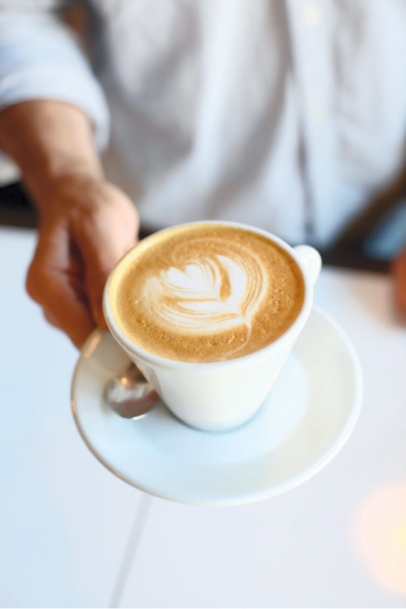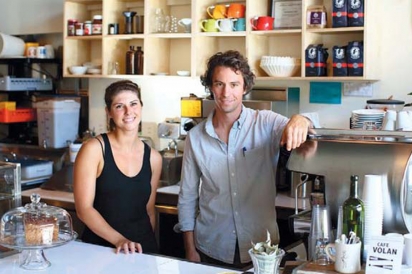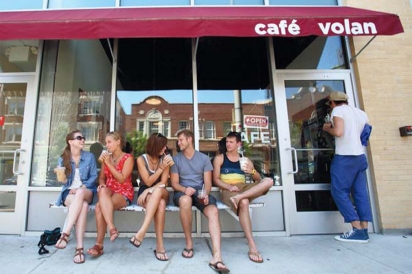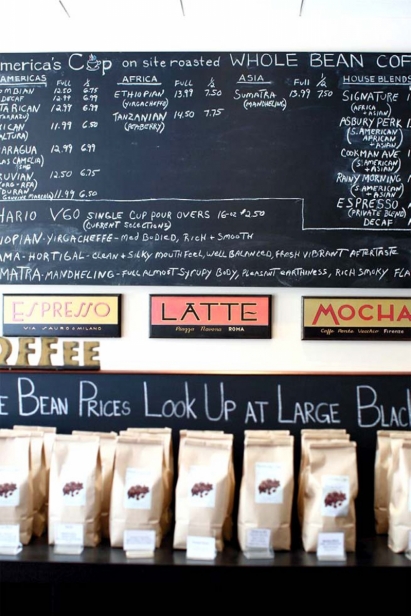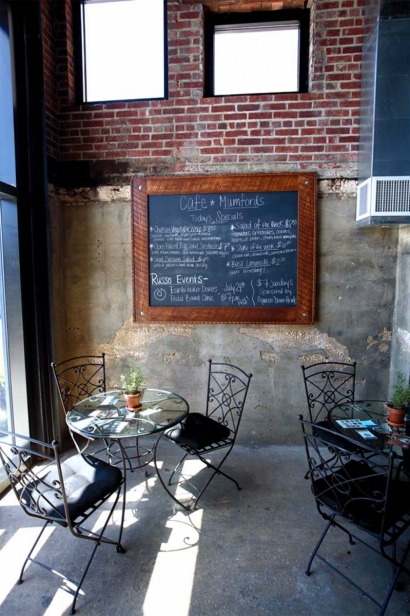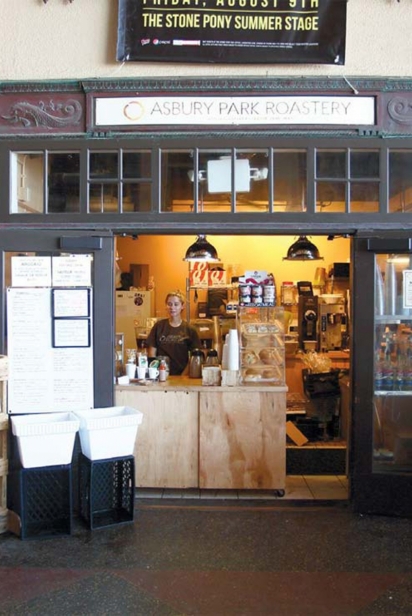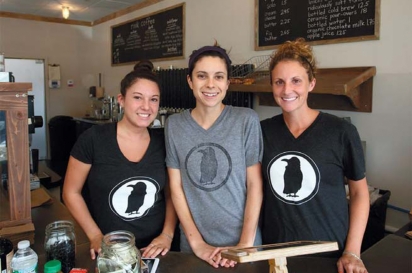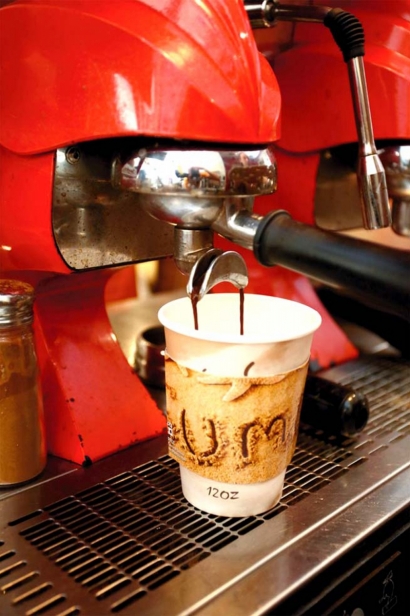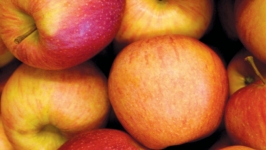Coffee Shops in Asbury Park
Asbury Perk
When Ross Blanco, a former bar owner from North Jersey, considered opening up a coffeehouse in Asbury Park, he began visiting cafés across the state as part of his market research. As he sat in coffeehouses, he flipped through the trade magazines lying around and read about small cafés that were roasting their own beans. He decided that's what he was going to do.
In 2006, Blanco bought himself a larger roaster and opened America's Cup Coffee Company on Cookman Avenue. He creates his own blends, using beans sourced from Colombia, Sumatra and Costa Rica, and he roasts only a few pounds at a time so that whatever he has on hand is always fresh.
Apparently Blanco was onto something, because in the last four years, two more roasters and two more coffee houses have opened up in and around Asbury Park.
Many high-end coffee shops now offer pour-over, which means the beans are ground to order and hot water is poured through the grinds fresh for each cup. Some go so far as to weigh the grinds and measure the water to make sure the ratio is perfect. "It's a process," Blanco says. "People have to be willing to wait, but it's a better cup of coffee."
While Asbury Park's coffee culture is still a far cry from that of San Francisco, Seattle or Portland, the city has attracted a young, hip population and is developing something of a restaurant scene. In response, the cafés and roasters that have opened up recently are taking coffee to the next level, above what you get at Starbucks or Dunkin' Donuts – though each company has a different vision of what the perfect cup of coffee looks like.
Paul Cali, 32, who is co-owner of Cafe Volan on Bangs Avenue, considers himself part of the coffee industry's "third wave." The first wave was bad coffee simply used as a vehicle for caffeine, he says. The second wave brought places like Starbucks, which offered a bettertasting cup but not yet one of the highest quality. The third wave raised the bar higher, bringing coffee almost to an art form. Purveyors pay close attention to the beans they use, the way they're roasted and how the drink is prepared.
"It's treating coffee as something more culinary, or just more complex," Cali says.
Cafe Volan, with its wood floors and heavily tattooed clientele, feels like it was plucked right out of Brooklyn, but for the distinct surfing and skateboarding theme. While the café sells pour-overs and iced coffee by the growler – a 32-ounce refillable jug typically used to sell beer – espresso-based drinks like cappuccinos and lattes are its specialties.
"That was a big thing for us, that our espresso was amazing," Cali says. "People have our cappuccino and say, 'I didn't even need to put sugar in it because it's being prepared so well.' That was our goal: preparing coffee in the best possible way."
What the café's owners don't do is roast their own beans. They use coffee from La Colombe, a brand they chose because it makes an incredible espresso, Cali says. The pair hope to eventually roast their own, but it's not something they wanted to jump into, because they feared if they weren't good at it, it might compromise taste.
"Anybody can roast a bean if you have the roaster, but it takes work to really do it right, and we wanted to make sure our coffee was consistently great across the board," Cali says. "We were confident in our ability as baristas but not as roasters."
A few blocks away, on Lake Avenue, is Cafe Mumford's, run by Mumford's Culinary Center in Tinton Falls. Chris and Debbie Mumford opened the café after being approached by a local developer who was renovating an old brick building on the edge of town to house a music school, guitar store and rehearsal space.
"When the idea of a café came along, my mom said, 'I want really good coffee, but I want to keep it simple,' " says Quincy Mumford, 21, a singer/songwriter and the owners' son.
And simple it is. The café has just a small selection of coffee – a dark roast, a mild roast, and their own blend of dark beans and chicory – all of which is made using beans from Kobrick Coffee Co. in Jersey City. They also serve a distinctive iced coffee, which is made with maple syrup.
"It's a different sugar, so it's a lot more flavorful," Quincy Mumford says. "I've never seen anyone else serve it that way."
Across town, Alli Kennedy, 40, has been roasting her own beans at Asbury Park Roastery on Second Avenue for about six years, and her coffee has become so popular she's opened a second location inside Convention Hall on Asbury Park's boardwalk. While her first location just sells coffee over the counter, the Convention Hall space looks more like a café, with tables and chairs and an espresso machine.
Kennedy worked in marketing and as a business analyst when she decided she wanted to launch her own business. She says she loved coffee, but wasn't sure opening a coffeehouse was for her, given that she's painfully shy. As she worked on her business plan, the question arose of where she would get her coffee, and she realized what she really wanted to do was be a roaster. She became an apprentice for a roaster in Howell for two years before opening her own roastery.
"It's hard to find someone who will spend their time with you when they know you're going to go out and open up your own business one day," she says. "Most people are pretty threatened by that."
Kennedy's focus now is on a new specialty line of coffee, which she is buying from individual small farms rather than from co-ops, which is how most coffee is sold. In a co-op, coffee from a number of plantations is combined. When you buy from one farmer or a micro lot, control is greater and thus the quality is better, she says [Editor's note: see "Pursuit of Perfection: A Coffee Lover's Journey," Edible Jersey Spring 2013]. Kennedy currently carries coffee from micro lots in Rwanda, Burundi and Ecuador.
"With a micro lot, the farm is not getting paid for the volume but for the quality, and they're being paid very well," she says. "When farmers go for volume, you wind up with ripened and unripened cherries. With these [specialty] coffees, they only pick the right cherries."
The raw coffee is also packaged in airtight shipping containers, rather than burlap bags, which protects it from losing moisture. But there's a cost: roasted co-op beans sell for about $10 a pound while micro-lot beans sell for at least $15 a pound. Kennedy has branded her micro-lot coffee the Saint Caretta line, and she thinks it's well worth the added cost.
"It's a good cup of coffee," she says. "It's like watching regular TV versus high definition. It's just another level of vibrancy."
Rook Coffee Roasters, another new roaster that's opened in the area, is also relying on micro lots to help raise the quality of their coffee. Co-owner Shawn Kingsley, 36, was a financial analyst at Morgan Stanley when he was laid off in 2009. He decided to open Rook with his childhood friend, Holly Migliaccio, 35, who had worked in marketing for Yahoo and several other companies. Both had lived in San Francisco at some point in their careers and had experienced the West Coast coffee culture. They wanted to open something similar on the Jersey Shore.
The business partners spent a year preparing – with Kingsley studying the fundamentals and chemistry of roasting while Migliaccio studied the industry – and in 2010, they opened Rook in Ocean Township, a coffee roaster and retail shop that only brews coffee by the cup, not the pot. The business has become so popular, the duo has expanded from one to four shops in just three years.
"A lot of people who come in here are looking for that next step in coffee," Magliaccio says. "It reminds me of what's gone on in the wine culture, in that over the past 10, 15, 20 years, wine drinkers have developed a more sophisticated palate."
Rook offers 10 different single-origin coffees, none of which are blends or have flavoring like hazelnut or French vanilla added. All are made from beans that were roasted within the week. The company sells no lattes or macchiatos. They just sell really good coffee, made by the cup, for each customer who walks in, Migliaccio says.
"It's a plain old American coffee," she says. "We love espresso, but that's not part of our model. There's not a lot of companies out there that strictly do pour-overs, so that steps us out a little bit."
With all these cafés and roasteries opening up, does Blanco feel the market is getting saturated? "Nah," he says. He believes he's created a niche all his own.
"My beans are what make my place unique. My coffee is my coffee. It's our brand."
AMERICA’S CUP COFFEE COMPANY
633 Cookman Ave., Asbury Park
732.988.2000
facebook.com/AmericasCupCoffeeCompany
CAFE VOLAN
510 Bangs Ave., Asbury Park
732.455.3399
cafevolan.com
ROOK COFFEE ROASTERS
60R Monmouth Rd., Oakhurst
732.483.4402
rookcoffeeroasters.com
CAFE MUMFORD’S
619 Lake Ave., Asbury Park
732.275.5794
mumfords.com/cafemumfords
ASBURY PARK ROASTERY
803 Second Ave., East Suite, Asbury Park
732.807.3155
aproastery.com


